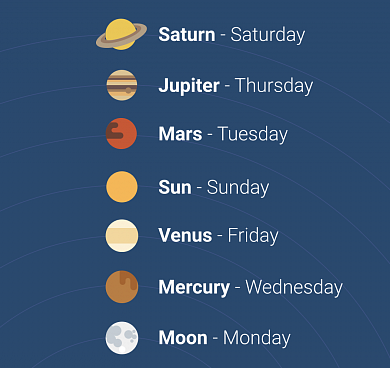So let's answer the second part first because we can go fast. Basically we got seven days and therefore seven day weeks because in antiquity, we had seven known planets: Mercury, Venus, Mars, Jupiter, Saturn, the Sun, and the Moon.
Yeah yeah, I know, the sun and the moon aren't planets. Well, they moved—or appeared to move—in the sky, so they were considered planets, which in ancient Greek was called πλανήτης (planētēs) which means wanderer.
Boom—so then the Babylonians came along and named seven days after the planets and set these days in a never-ending cycle that we are still following today. The Romans then copied this seven day week, using their own names. The Roman Empire and culture spread across Europe through the Pax Romana and everyone started adopting the cool new system. The Germanic and Norse cultures then thought the Romans had something pretty neat in their system of seven-day weeks, so they copied it, and that is the system that came into English.

- Sunday for Sun Day. I mean, obviously. That one is pretty easy to see.
- Monday for Moon Day. Also fairly easy to see.
- Tuesday for Tiw Day. Tiw, also spelled Tyr, is the Norse god of war, corresponding with the Roman god of war, Mars. Ah hah—it's Mars Day!
- Wednesday for Woden Day. These days Woden is better known as Odin, maybe because of Marvel comics. Odin may be most associated with wisdom and eloquence, and Tolkien nerd might know that Gandalf is more or less Odin. One of Odin's many roles was as a messenger. Who does that remind you of in Roman mythology? That's right: Mercury. Wednesday is Mercury Day.
- Thursday for Thor Day. This on is pretty well known these days. But do you know what planet Thor lines up with? Hint: What is Thor's main power? Lightning, right? And what Roman god was the thunderbolt and lightning guy? Jupiter—probably better known these days by his Greek name, Zeus. It's Jupiter Day!
- Friday for Frigg (or Freyja) Day. Another one that you might not immediately know. Frigg was the Norse goddess of love and beauty. Remind you of anyone? It's Venus Day.
- Saturday for Saturn Day. Saturn being the father of Jupiter, the god of time and harvest. You may know Saturn better by his Greek name, Cronus, the Titan and father of Zeus.
Now you may be asking why does it seem like three of those names come from Latin if English got their day names from the Norse? Well because the Germanic and Norse cultures later adapted the Roman names for their own gods. That’s why English weekdays have a mix of Latin and Norse names.
There we go. So we get the seven day week from the Babylonians naming days after known planets, then we get three day names from Latin and four day names from Norse.
Fun stuff. It’s amazing how this ancient system has shaped our week even today!
Next time I'll get into the Japanese for the week. Japan also follows the seven day week. It came from China and before that we can trace it back to Rome. Before the seven day week came to Japan they didn't really follow the idea of a week... the closest thing may have been the ten day periods called jun, which they still follow, by the way.
Anyway, we'll get into that next time.
Leave comments and questions.
❦
 |
David LaSpina is an American photographer and translator lost in Japan, trying to capture the beauty of this country one photo at a time and searching for the perfect haiku. He blogs here and at laspina.org. Write him on Twitter or Mastodon. |
 )
)
